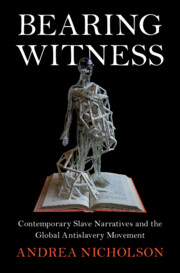40 results
Conclusion
-
- Book:
- Bearing Witness
- Published online:
- 22 September 2022
- Print publication:
- 29 September 2022, pp 174-182
-
- Chapter
- Export citation
Acknowledgments
-
- Book:
- Bearing Witness
- Published online:
- 22 September 2022
- Print publication:
- 29 September 2022, pp xix-xx
-
- Chapter
- Export citation
Preface
-
- Book:
- Bearing Witness
- Published online:
- 22 September 2022
- Print publication:
- 29 September 2022, pp xiii-xviii
-
- Chapter
- Export citation
Contents
-
- Book:
- Bearing Witness
- Published online:
- 22 September 2022
- Print publication:
- 29 September 2022, pp ix-x
-
- Chapter
- Export citation
Epigraph
-
- Book:
- Bearing Witness
- Published online:
- 22 September 2022
- Print publication:
- 29 September 2022, pp vii-viii
-
- Chapter
- Export citation
5 - Assuming “Full” Freedom
-
- Book:
- Bearing Witness
- Published online:
- 22 September 2022
- Print publication:
- 29 September 2022, pp 128-156
-
- Chapter
- Export citation
Bibliography
-
- Book:
- Bearing Witness
- Published online:
- 22 September 2022
- Print publication:
- 29 September 2022, pp 199-224
-
- Chapter
- Export citation
Introduction
-
- Book:
- Bearing Witness
- Published online:
- 22 September 2022
- Print publication:
- 29 September 2022, pp 1-18
-
- Chapter
- Export citation
Index
-
- Book:
- Bearing Witness
- Published online:
- 22 September 2022
- Print publication:
- 29 September 2022, pp 225-233
-
- Chapter
- Export citation
1 - A Narrated Self
-
- Book:
- Bearing Witness
- Published online:
- 22 September 2022
- Print publication:
- 29 September 2022, pp 19-47
-
- Chapter
- Export citation
3 - The Construction and Reconstruction of Survivor Identities
-
- Book:
- Bearing Witness
- Published online:
- 22 September 2022
- Print publication:
- 29 September 2022, pp 71-94
-
- Chapter
- Export citation
Figures
-
- Book:
- Bearing Witness
- Published online:
- 22 September 2022
- Print publication:
- 29 September 2022, pp xi-xii
-
- Chapter
- Export citation
Appendix: Table of Narratives analyzed
-
- Book:
- Bearing Witness
- Published online:
- 22 September 2022
- Print publication:
- 29 September 2022, pp 183-198
-
- Chapter
- Export citation
6 - Antislavery Strategies and the Survivor as Activist
-
- Book:
- Bearing Witness
- Published online:
- 22 September 2022
- Print publication:
- 29 September 2022, pp 157-173
-
- Chapter
- Export citation
2 - “I Was Free, I Still Wasn’t Free”
-
- Book:
- Bearing Witness
- Published online:
- 22 September 2022
- Print publication:
- 29 September 2022, pp 48-70
-
- Chapter
- Export citation
4 - Bearing Witness
-
- Book:
- Bearing Witness
- Published online:
- 22 September 2022
- Print publication:
- 29 September 2022, pp 95-127
-
- Chapter
- Export citation
Copyright page
-
- Book:
- Bearing Witness
- Published online:
- 22 September 2022
- Print publication:
- 29 September 2022, pp vi-vi
-
- Chapter
- Export citation

Bearing Witness
- Contemporary Slave Narratives and the Global Antislavery Movement
-
- Published online:
- 22 September 2022
- Print publication:
- 29 September 2022
10 - Integrated and Indivisible
-
-
- Book:
- Fighting Modern Slavery and Human Trafficking
- Published online:
- 18 June 2021
- Print publication:
- 01 July 2021, pp 203-224
-
- Chapter
- Export citation
Section 2 - Comprehensive assessment
-
- Book:
- Parental Psychiatric Disorder
- Published online:
- 05 July 2015
- Print publication:
- 09 July 2015, pp 61-106
-
- Chapter
- Export citation

